Global Climate

How does climate variability affect global weather patterns ?
The impact of climate variability on global weather patterns is substantial, affecting temperature, precipitation, wind patterns, and extreme weather events. Key influences include El Niño and La Niña phases, monsoon systems, altered rainfall distribution, jet stream variations, tropical cyclones, heatwaves, cold spells, storms, floods, and droughts. Long-term climate trends like global warming also significantly affect weather patterns. Understanding these interactions is crucial for predicting future conditions and addressing climate-related challenges.

How effective has the United Nations Framework Convention on Climate Change (UNFCCC) been in addressing global climate change ?
The United Nations Framework Convention on Climate Change (UNFCCC) is a global treaty adopted in 1992 to stabilize greenhouse gas concentrations and prevent dangerous interference with the climate system. While it has achieved some successes, such as promoting international cooperation and establishing mechanisms for climate finance and technology transfer, its effectiveness has been limited by factors like lack of compliance and political will. To make a significant impact on global climate change, stronger commitment and concrete actions from all parties involved are necessary.

What is the Paris Agreement and how does it contribute to global climate governance ?
The Paris Agreement, adopted in 2015, is a landmark global climate change agreement aimed at limiting global warming to below 2°C and pursuing efforts to limit it to 1.5°C above pre-industrial levels. It contributes significantly to global climate governance by establishing mechanisms such as Nationally Determined Contributions (NDCs), enhancing transparency and accountability, providing finance and capacity building, addressing loss and damage, conducting global stocktakes, and setting long-term goals. These measures help track progress, hold countries accountable for their commitments, support vulnerable nations, assess collective progress, and encourage more aggressive action towards mitigating climate change.

What role does global warming play in climate predictions ?
The text discusses the role of global warming in climate predictions, emphasizing its multifaceted impact on various aspects of the Earth's climate system. Key points include increased temperatures leading to melting ice, rising sea levels, and changes in precipitation patterns; intensified extreme weather events like heat waves and hurricanes; ocean acidification harming marine life; alterations in ecosystems affecting animal migration and habitats; agricultural impacts such as changing crop yields and growing seasons; and human health concerns including the spread of diseases and heat-related illnesses. The conclusion stresses the importance of considering these factors in future climate projections and mitigating the effects of global warming through reduced greenhouse gas emissions.

How do climate skeptics refute the evidence of global warming ?
The text discusses the arguments put forward by climate skeptics and examines their validity in light of current scientific knowledge. The main points covered include: - Misinterpretation of data: Climate skeptics often misinterpret or selectively choose data to support their claims, focusing on short-term fluctuations rather than long-term trends. However, when all available data is considered, it becomes clear that global temperatures have been rising steadily over the past century. - Natural variability: Climate skeptics argue that natural factors such as changes in solar radiation or volcanic activity can explain the observed warming trend without human intervention. However, these factors cannot account for the rapid increase in temperatures seen over the past few decades, and even when included in models, human activities remain the primary driver of global warming. - Alternative explanations: Some climate skeptics propose alternative explanations for the observed warming trend, such as changes in ocean currents or atmospheric circulation patterns. However, these theories lack empirical evidence and fail to explain many of the observed changes in our climate system. - Economic motives: Some climate skeptics may have economic motives for their views, such as fossil fuel companies and other industries that rely on carbon-intensive practices. By casting doubt on the scientific consensus around global warming, these groups hope to delay action on climate change and preserve their profits. Overall, the text concludes that while there may be legitimate debates around specific aspects of climate science, the overwhelming majority of scientists agree that human activities are contributing to global warming. Climate skeptics' arguments do not hold up under scrutiny, and it is crucial that we continue to invest in research and take action to mitigate the effects of climate change before it is too late.

How can developing countries participate effectively in global climate cooperation ?
Developing countries can participate effectively in global climate cooperation by building capacity for climate action, promoting sustainable development pathways, engaging actively in international climate negotiations, and leveraging domestic resources and partnerships. This involves developing national climate policies and strategies, strengthening institutional capacity, integrating climate considerations into national development plans, fostering innovation and technology transfer, participating in global climate dialogue, seeking international support and financing, mobilizing domestic resources for climate action, and fostering cross-sectoral partnerships. By taking these steps, developing countries can contribute significantly to mitigating climate change and adapting to its impacts while promoting sustainable development and poverty reduction.

How does the Paris Climate Agreement aim to reduce global warming ?
The Paris Climate Agreement, adopted in 2015, is a global pact with the primary objective of limiting global warming to below 2°C and pursuing efforts to limit it further to 1.5°C above pre-industrial levels. This summary explores key aspects of the agreement: 1. **Long-term Temperature Goals** emphasize holding the increase in global average temperature well below 2°C and pursuing efforts for 1.5°C. 2. **Nationally Determined Contributions (NDCs)** require each country to set voluntary targets on greenhouse gas emissions and climate change plans. 3. **Enhanced Transparency and Accountability** introduce a system for monitoring compliance through regular reporting. 4. **Finance and Capacity Building** involve developed countries providing financial assistance and capacity building to developing nations. 5. **Loss and Damage** address inevitable impacts of climate change by creating a mechanism for dealing with associated losses. 6. **Global Stocktake** is a periodic review process to assess global progress toward meeting the agreement's goals. 7. **Cooperation and Implementation** highlight the importance of international collaboration for effective implementation of the agreement. These components work together to create a comprehensive approach aimed at mitigating the effects of climate change and adapting to its impacts.

How can international cooperation on climate change contribute to global security ?
International cooperation on climate change is vital for global security. It helps mitigate environmental disasters, promotes economic stability and growth, enhances social cohesion and peace, facilitates technology and knowledge sharing, and strengthens global governance and diplomacy. Through joint efforts, nations can address one of the most pressing challenges of our time and secure a safer future for all.

In what ways can developing countries participate effectively in global climate governance ?
**How Developing Countries Can Effectively Participate in Global Climate Governance** Developing countries are pivotal in global climate governance due to their disproportionate impact from climate change. Their effective participation can be achieved through several strategies: 1. **Capacity Building**: This involves enhancing educational programs to raise climate awareness and training local experts. It also includes investing in sustainable infrastructure and establishing research institutions. 2. **Policy Integration**: Countries should enact climate-related legislation, set emission reduction targets, and ensure policy alignment across different sectors while engaging stakeholders. 3. **Finance and Investment**: Access international and domestic funds for climate action, and make smart investments in renewable energy and sustainable agriculture. 4. **Technology Transfer and Innovation**: Developing countries should form technology partnerships, create exchange platforms, and encourage local innovation through R&D and incentives. 5. **Participation in International Negotiations**: They should prepare well for negotiations, build coalitions, advocate for their interests, and use forums for dialogue at international conferences. Through these strategies, developing countries can not only protect themselves but also significantly contribute to the global fight against climate change.

How do climate change negotiations affect global trade and economic systems ?
Climate change negotiations play a crucial role in shaping global trade and economic systems. These negotiations aim to find solutions to the challenges posed by climate change, such as reducing greenhouse gas emissions, promoting renewable energy sources, and protecting biodiversity. The outcomes of these negotiations have far-reaching implications for international trade, investment, and economic development. In this article, we will explore how climate change negotiations affect global trade and economic systems. One of the key impacts of climate change negotiations on international trade is the imposition of tariffs and subsidies on goods and services that contribute to climate change. For example, countries may impose higher tariffs on imported goods that are produced using high levels of carbon emissions or other environmentally harmful practices. Similarly, governments may provide subsidies to domestic industries that adopt sustainable practices or invest in renewable energy technologies. These measures can create trade barriers and distort market competition, affecting global trade patterns. Another way in which climate change negotiations can influence international trade is through the implementation of carbon pricing mechanisms, such as carbon taxes or cap-and-trade systems. These mechanisms aim to internalize the external costs of carbon emissions by making polluters pay for their emissions. As a result, companies that rely heavily on fossil fuels or produce high levels of emissions may face increased costs, making their products less competitive in global markets. On the other hand, companies that invest in low-carbon technologies or adopt sustainable practices may gain a competitive advantage. Climate change negotiations often lead to the adoption of stricter environmental standards and regulations at both national and international levels. These standards can affect international trade by creating compliance costs for exporters and importers. For instance, companies that export goods to countries with stringent environmental regulations may need to invest in cleaner production processes or face penalties for non-compliance. Similarly, importers may prefer to source goods from suppliers that meet certain environmental standards, affecting trade flows and market access. Climate change negotiations also have significant implications for investment and economic development. As countries commit to achieving ambitious climate targets, there is an increasing demand for green finance and investment in sustainable projects. This can create new opportunities for investors and businesses that focus on renewable energy, energy efficiency, and other low-carbon sectors. However, it can also lead to capital flight from traditional fossil fuel industries, affecting economies that rely heavily on these sectors. Climate change negotiations often include provisions for technology transfer and innovation cooperation between developed and developing countries. This can help bridge the gap between countries with different levels of technological capabilities and promote sustainable development worldwide. By facilitating the transfer of clean energy technologies and supporting research and development efforts, climate change negotiations can foster economic growth and job creation in emerging markets. Finally, climate change negotiations address the urgent need for adaptation financing and support for vulnerable communities affected by climate change. This includes funding for infrastructure improvements, disaster risk reduction, and other measures that help countries adapt to changing climate conditions. While these efforts are essential for protecting human lives and livelihoods, they also represent significant economic opportunities for businesses involved in climate resilience and adaptation services. In conclusion, climate change negotiations have far-reaching implications for global trade and economic systems. By imposing tariffs and subsidies, implementing carbon pricing mechanisms, setting environmental standards, promoting green finance and investment, facilitating technology transfer and innovation, and providing adaptation financing and support, these negotiations shape the future direction of international trade and economic development. As we continue to grapple with the challenges posed by climate change, it is crucial for policymakers, businesses, and civil society to work together to ensure that our responses to this global challenge are aligned with our collective goals for sustainable prosperity.
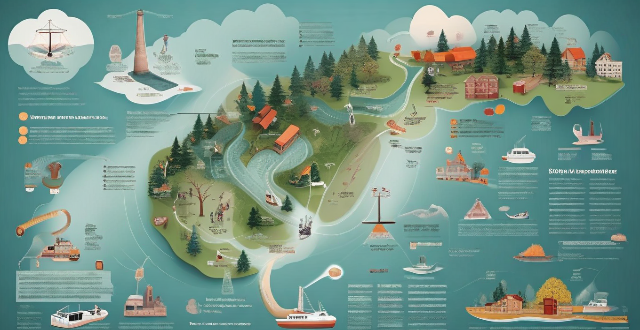
What are the impacts of climate change on global weather patterns ?
Climate change, driven by human activities like burning fossil fuels and deforestation, is altering global weather patterns. These changes include increased frequency and intensity of extreme weather events such as heatwaves, heavy precipitation, droughts, and storms, as well as changes in seasonal weather patterns like early spring onset and altered monsoon patterns. Long-term changes in weather patterns include polar amplification, ocean circulation changes, and atmospheric circulation changes. These impacts pose significant challenges for adaptation and mitigation efforts aimed at reducing negative effects on ecosystems, societies, and economies worldwide.

Can national governments alone tackle the issue of climate change, or is international cooperation necessary for effective global climate governance ?
Climate change is a complex issue that requires global cooperation to effectively tackle. While national governments can implement policies and invest in research within their borders, the interconnectedness of climate change factors necessitates international collaboration. Global agreements, technology transfer, and financial support are crucial components of this cooperation. Ultimately, a combination of national efforts and international partnerships is needed for effective climate governance.

How can carbon capture technology be scaled up to address global climate change ?
The article discusses the challenges and strategies associated with scaling up carbon capture technology (CCT) to mitigate global climate change. The challenges include high costs, technological limitations, infrastructure and logistics issues, and regulatory and legal frameworks. To overcome these challenges, strategies such as policy and economic incentives, technological innovation, infrastructure development, public-private partnerships, and international cooperation are proposed. Scaling up CCT is crucial in reducing atmospheric CO2 levels and combating global climate change.

How do climate data analysis contribute to understanding global warming ?
Climate data analysis is essential for understanding global warming, its causes, effects, and potential solutions. Scientists collect temperature records, carbon dioxide concentrations, and sea level data to identify trends, establish correlations, and create predictive models. These efforts help develop effective strategies to mitigate the impacts of global warming.
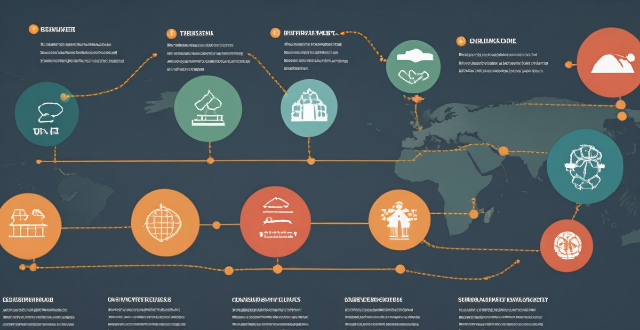
How does TCFD align with other global reporting initiatives like the Global Reporting Initiative (GRI) ?
The Task Force on Climate-related Financial Disclosures (TCFD) and the Global Reporting Initiative (GRI) are two global sustainability reporting frameworks that share several key points of alignment. Both provide guidelines for companies to report on their sustainability performance, with TCFD focusing specifically on climate-related financial disclosures and GRI covering a broader range of sustainability issues. They also emphasize the importance of materiality assessment, stakeholder engagement, risk management, and climate change disclosures in determining which aspects are most relevant to an organization's business model and strategy. By following both frameworks, companies can provide a more comprehensive picture of their sustainability performance and demonstrate their commitment to addressing climate change and other sustainability issues.

Is geoengineering a viable solution to global warming ?
Geoengineering, also known as climate engineering or earth system management, refers to the intentional manipulation of the global climate on a large scale to counteract the effects of global warming and reduce the risks associated with climate change. While geoengineering has potential benefits such as mitigating climate change, providing faster responses compared to conventional methods, and being relatively inexpensive, it also comes with uncertainties regarding long-term effects, lack of international regulation and governance, and limited scope compared to other mitigation strategies. Therefore, geoengineering should not be seen as a substitute for conventional mitigation strategies but rather complement them. Extensive research and international cooperation are essential before implementing any large-scale geoengineering projects to ensure their safety and effectiveness in addressing climate change challenges.
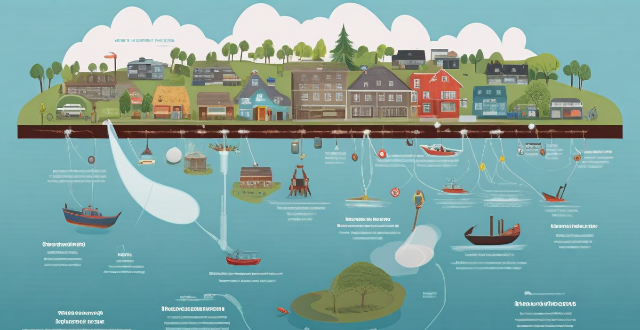
What is the role of global warming in climate disasters ?
The article discusses the significant role of global warming in climate disasters, highlighting its impacts on extreme weather events, sea level rise, ecosystems, and food security. It emphasizes the importance of taking action to mitigate these effects through strategies such as reducing greenhouse gas emissions, adapting to changing climate conditions, supporting research and innovation, and encouraging international cooperation.

How do climate summits contribute to global efforts to combat climate change ?
Climate summits play a crucial role in the global fight against climate change by setting targets and goals, encouraging international cooperation, promoting policy and technological innovation, raising awareness and mobilizing action, and financing climate action.

What is the significance of the Green Climate Fund in supporting climate initiatives globally ?
The Green Climate Fund (GCF) supports climate initiatives globally by providing financial and technical resources for mitigation and adaptation projects. It encourages private sector participation, strengthens institutions, and promotes gender equality and social inclusion in climate actions.

How have recent climate disasters impacted the discourse on global climate governance ?
The article discusses how recent climate disasters have impacted the discourse on global climate governance. It highlights increased awareness and urgency of addressing climate change, focus on resilience and adaptation measures, and the need for collaboration and cooperation among nations. The article concludes that effective strategies and policies are necessary to mitigate the impacts of climate change and ensure a sustainable future.

What is the significance of climate finance in achieving the goals of global climate governance ?
Climate finance is vital for achieving global climate governance goals, supporting mitigation, adaptation, sustainable development, innovation, cooperation, transparency, policy integration, capacity building, and private sector engagement.
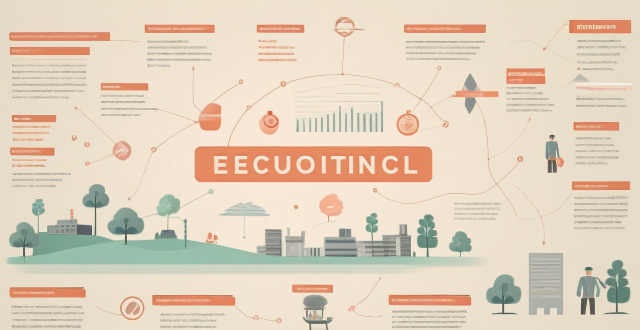
How does climate cooperation impact global economic growth ?
Climate cooperation has a positive impact on global economic growth by fostering new industries, promoting international trade and investment, stimulating innovation and research, enhancing resilience against climate impacts, and encouraging policy coherence and stability.
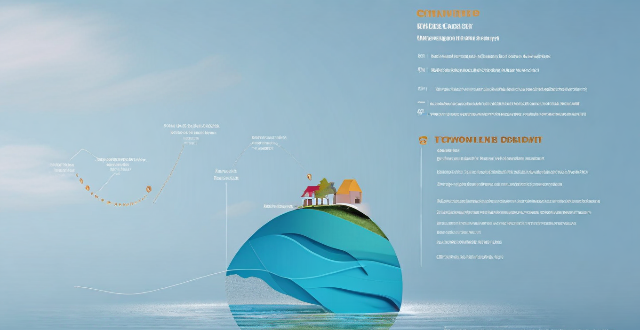
How does climate change affect global supply chain management ?
Climate change affects various aspects of life, including global supply chain management. Extreme weather events, rising sea levels, changes in agricultural production, energy costs, and labor availability are some ways in which climate change impacts this crucial aspect of business operations. Businesses must adapt their strategies to mitigate these risks and ensure the continued efficiency and effectiveness of their operations.

How can international education help address global issues like climate change and inequality ?
International education plays a crucial role in addressing global issues by promoting cross-cultural understanding, enhancing global citizenship, building networks and partnerships, promoting sustainable development through curriculum changes and research initiatives focused on sustainability principles, and encouraging collaboration among individuals and organizations from around the world.
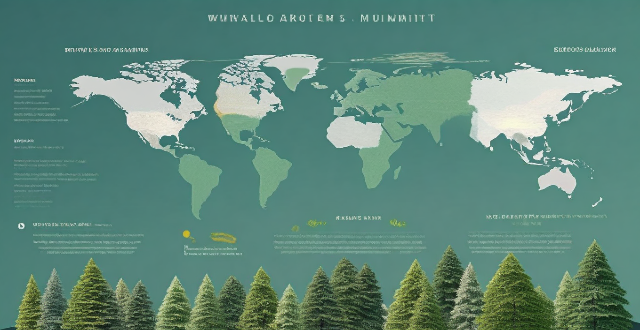
When and where was the last major climate summit held ?
The last major climate summit, COP26, was held in Glasgow, Scotland from October 31 to November 12, 2021. The conference aimed to review progress made since the Paris Agreement and strengthen the global response to climate change. Several significant outcomes were achieved, including pledges to cut emissions, finance for climate action, preservation of forests as carbon sinks, reduction of methane emissions, establishment of a loss and damage fund, emphasis on adaptation and resilience, youth and civil society engagement, just energy transition, plans for future meetings, and an initial global stocktake. However, many believe that the commitments made are still not enough to limit global warming to well below 2 degrees Celsius or achieve the more ambitious goal of 1.5 degrees Celsius.

How can technology transfer and innovation support global climate governance efforts ?
Technology transfer and innovation support global climate governance by reducing greenhouse gas emissions, adapting to climate change, and mitigating its impacts. They also enable data collection and analysis, international collaboration, and financing for climate action.

How effective have international agreements, like the Paris Agreement, been in addressing global warming ?
The Paris Agreement, adopted in 2015, is a global climate accord aimed at limiting global warming to well below 2°C, ideally to 1.5°C, above pre-industrial levels. Key features include long-term goals for balancing emissions with removals by sinks, nationally determined contributions (NDCs) for emission reductions and adaptation efforts, transparency in reporting, financial support for developing nations, and mechanisms for addressing loss and damage due to climate change impacts. The agreement has been praised for its ambitious targets, widespread participation, flexibility, and promotion of international cooperation but faces challenges such as lack of enforcement, insufficient ambition in NDCs, reliance on political will, and equity concerns. Despite these challenges, progress has been made in areas like renewable energy growth, clean technology innovation, and green finance. The overall effectiveness of the Paris Agreement hinges on the commitment and actions of its signatories, requiring enhanced cooperation and sustained effort to achieve its goals.

What is global warming and how does it affect the Earth's climate ?
Global warming is causing rising sea levels, extreme weatherGlobal warming is causing rising sea levels, extreme weatherdiversity, ocean acid ocean acidification, melting permafrost, changes in precipitation patterns, and agricultural impacts. It is a complex issue with far-reaching consequences for our planet's climate. Addressing global warming requires international cooperation and concerted efforts to reduce GHG emissions and transition to renewable energy sources.
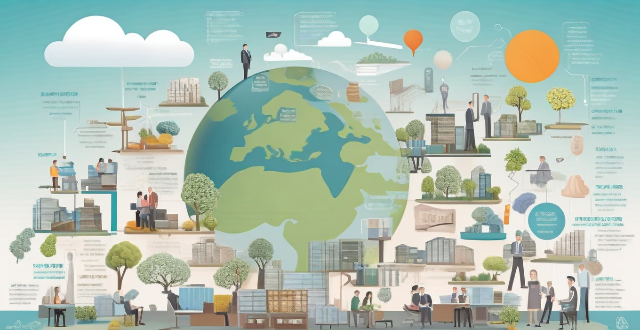
What is the importance of international cooperation in addressing climate change ?
International cooperation is crucial in addressing the global challenge of climate change. It enables shared responsibility, economic efficiency, political will, global impact, innovation and technology transfer, and strengthening multilateralism. By working together through international organizations and treaties, countries can take decisive action on climate change and create a sustainable future for all.
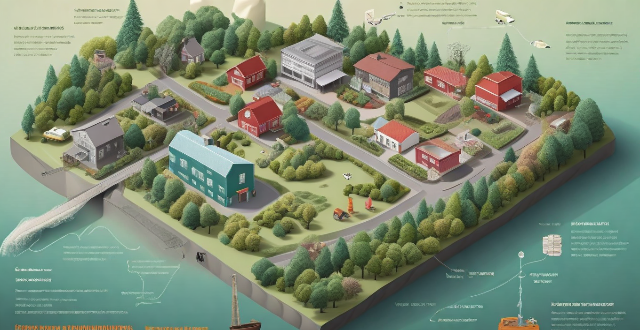
What is the impact of climate change on the global economy ?
Climate change affects the global economy in various ways, including reduced crop yields, water scarcity, forest fires, changes in energy production, human health issues, displacement and migration, and insurance and financial risks. Addressing climate change is crucial for both environmental and economic reasons.